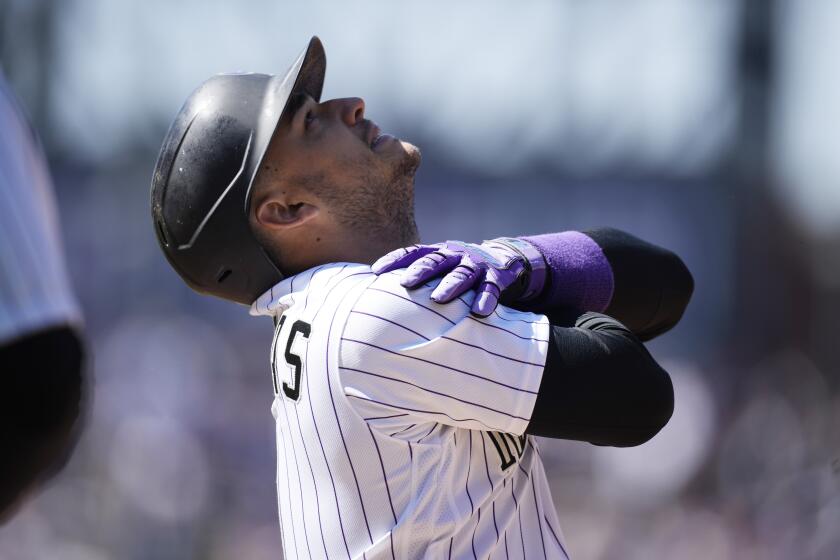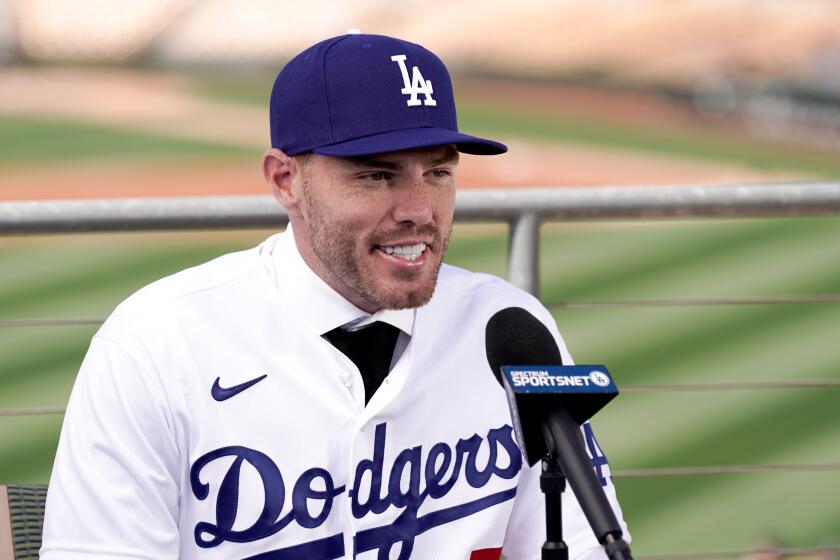Here’s what you need to know
- Share via
Clayton Kershaw perfect through seven, Dodgers offense explodes. Missed opportunity?
MINNEAPOLIS — The last time Clayton Kershaw had pitched in a regular season game, it seemed like his Dodgers tenure was coming to an imperfect end.
On Wednesday, his time with the club resumed with a resounding — and almost perfect — bang.
In his first start since re-signing with the Dodgers this winter, Kershaw pitched seven perfect innings before being taken out of the game. The Dodgers lost the combined perfect game bid an inning later, when Gary Sánchez singled against reliever Alex Vesia, but still went on to a 7-0 win against the Minnesota Twins.
In an 80-pitch season debut, Kershaw struck out 13 batters, dominated with a slider-heavy mix, and flashed vintage form after struggling with an elbow injury last year.
Barely a month ago, Dodgers coaches were unsure if Kershaw would even be able to be part of the season-opening roster. His 2021 season had ended on the second to last day of the season, after he re-aggravated the elbow injury and was forced to miss the playoffs.
The day he got hurt, Kershaw walked off the mound with the ball tightly in his grasp. He disappeared into the dugout as a pending free agent, uncertain if he would pitch for the Dodgers again.
He not only returned this spring, but pitched “as good as I’ve seen him from day one in spring training in all my six years with him,” manager Dave Roberts said.
And when the left-hander stepped atop the mound for the 12:10 p.m. start Wednesday, an overcast sky as gray as his road uniform hanging overhead, he looked as dominant as he ever has in his Hall of Fame career.
He pounded fastballs over all parts of the zone, four-seamers that were slower than when he was in prime but effectively located on either side of the plate.
He spun sliders that evaded swing after swing, the pitch accounting for 11 of the 13 strikeouts he racked up during his 66th career double-digit punchout game.
For most of the afternoon, the Dodgers’ defense hardly had to work behind him. There was a routine ground ball to third baseman Justin Turner in the first inning, pop ups to first baseman Freddie Freeman and second baseman Gavin Lux in the second and third, and a couple lazy fly balls to the outfield.
None of the eight balls the Twins put in play against Kershaw recorded an exit velocity of at least 95 mph (MLB’s definition of a “hard-hit” baseball). And not until the end of the seventh did they come close to recording a hit, when Gio Urshela hit a ground ball up the middle that somehow missed Kershaw and bounced off the mound, yet was fielded by Lux for the inning’s final out.
By that point, Roberts had already been thinking about taking Kershaw out of the game.
Kershaw had been held back until the fifth game of the season in order to have extra time to build up arm strength, but still was only stretched out to about 75 pitches after the lockout-shortened spring.
So, while the Dodgers got back-to-back-to-back home runs from Cody Bellinger, Lux and Austin Barnes in the top of the eighth, doubling the three-run lead they’d built in the first two innings, Roberts called to the bullpen and had Vesia warm up.
Kershaw seemed to know what was coming when he returned to the dugout after the seventh. After shooting a grin to Lux as he walked off the field, Kershaw bumped his teammates’ fists on the bench, then hugged Barnes in a short embrace.
If he was upset, he didn’t show it. The 34-year-old didn’t have a perfect game, but had still completed an almost perfect day.
- Share via
Clayton Kershaw seems OK with being removed despite perfect game bid
Clayton Kershaw appeared relaxed and on board with Dodgers manager Dave Roberts’ decision to remove the veteran left-hander after seven perfect innings against the Twins.
Kershaw roamed the dugout, conversing with his teammates as well as Roberts, after being removed.
This was the most dominant performance of Kershaw’s illustrious 15-year career. He needed only 80 pitches to retire 21 batters, throwing 53 strikes and striking out 13.
Roberts clearly was taking a long view of the season and of Kershaw’s health. However, the realization of a missed opportunity at immortality came when Dodgers reliever Alex Vesia gave up a solid single to Gary Sanchez with one out in the eighth.
Justin Bruihl retired the side in the ninth for the Dodgers, who won, 7-0.
Kershaw’s historic performance overshadowed the Dodgers breaking out on offense. Cody Bellinger, Gavin Lux and Austin Barnes homered in a row and Max Muncy also homered.
- Share via
No more perfecto. No more no-no. Gary Sanchez singles off Alex Vesia in the eighth
Twins catcher Gary Sanchez hit a sharp single to right-center field with one out in the eighth inning against Dodgers reliever Alex Vesia to end a perfect-game bid.
Vesia replaced Clayton Kershaw, who retired all 21 batters he faced through seven innings, striking out 13. Kershaw threw 80 pitches in his first start of the season and first after rehabbing all offseason from an injury.
Vesia, a left-hander, retired the first batter on a ground ball to shortstop, but Sanchez hit the first pitch — a fastball off the outer edge of the plate — on a line into the outfield. Vesia then walked Max Kepler on four pitches before retiring the next two hitters to keep a shutout in play.
- Share via
Dodgers hit three consecutive home runs in the eighth to lead 6-0
The Dodgers accentuated what so far has — literally — been a perfect game by hitting three consecutive home runs in the eighth inning.
No. 7 batter Cody Bellinger, No. 8 Gavin Lux and No. 9 Austin Barnes all connected against Twins reliever Dereck Rodriguez to extend the lead to 6-0.
Meanwhile, it appears Clayton Kershaw won’t go out for the eighth inning despite having retired all 21 batters through seven. He threw 80 pitches.
Left-hander Alex Vesia replaced Kershaw and attempted to continue perfection.
- Share via
Outstanding play by Gavin Lux preserves Clayton Kershaw’s perfect-game big in seventh
Clayton Kershaw remains perfect through seven innings, helped by the first outstanding defensive play he’s needed.
With two out, Twins No. 3 batter Geo Urshela hit a sharp groundball up the middle. Second baseman Gavin Lux shifted to the left side of the infield, ranged to his left, picked a tough hop and threw him out.
It was Kershaw’s 80th pitch, and 53rd in the strike zone. He notched his 13th strikeout to lead off the inning.
Kershaw’s only career no-hitter came against the Colorado Rockies at Dodger Stadium on June 18, 2014. He had 15 strikeouts.
- Share via
Clayton Kershaw untouchable — OK, perfect — through six innings
Clayton Kershaw has been remarkably efficient, while also being unhittable through six innings.
Let’s just say it: He’s been perfect.
The 34-year-old left-hander has struck out 12 while walking none and giving up no hits. He’s thrown only 69 pitches, 47 for strikes.
Kershaw’s slider has been especially effective, accounting for most of the strikeouts. He also he threw his first changeup of the season for a swinging strike with one out in the fifth.
In the sixth, Kershaw’s 10th strikeout got everybody a free Jumbo Jack. He notched his 11th strikeout on a check swing by Miguel Sano. And he recorded the 12th when he sneaked a 90-mph fastball past Nick Gordon.
- Share via
Chris Paddack simply cannot get Mookie Betts out
After leading off the first inning with a double, Mookie Betts singled with one out in the second and Freddie Freeman followed with a cue shot down the third-base line for a double that advanced Betts to third.
Betts, who scored on Trea Turner’s sacrifice fly to extend the Dodgers lead to 3-0, is five for five lifetime against Twins starter Chris Paddack with two doubles and a home run.
Max Muncy nearly broke out of his early slump, but his towering fly ball to the wall in right was caught on the run by Max Kepler.
- Share via
Clayton Kershaw begins his season with two strikeouts on sliders
Clayton Kershaw breezed through his first inning of the season, striking out Byron Buxton and Luis Arraez before getting Gio Urshela on a routine ground ball to third base.
Kershaw’s slider looks especially effective early on. He used the pitch for strike three on Buxton and Arraez and to induce the rollover grounder from Urshela.
The temperature is 39 degrees F and the wind-chill factor about 10 degrees lower than that, weather that impacts batters more than the pitcher. If a ball isn’t barreled up, a batter’s hands sting.
- Share via
Clayton Kershaw takes mound up 2-0 after Justin Turner drives in two in top of first
The Dodgers gave Clayton Kershaw a cushion before he took the mound, scoring two runs in the first inning against Chris Paddack.
Paddack, acquired from the San Diego Padres and making his first start for the Twins, came in with a 7.07 ERA against the Dodgers. It ballooned from there.
Mookie Betz doubled to left, and after Freddie Freeman was robbed on a diving catch by left fielder Nick Gordon, Trea Turner singled on a dribbler to third and stole second, Max Muncy was hit by a pitch and Justin Turner shot an 0-2 high fastball to right that scored Betz and Turner.
Paddack couldn’t field Chris Taylor’s nubber toward first for an error that again loaded the bases. But he struck out Cody Bellinger on a full-count fastball and induced Gavin Lux to ground out.
Kershaw took the 2-0 lead to the mound.
- Share via
Dodgers Dugout exclusive: Maury Wills thanks fans, Dodgers for his special night
Saturday night is Maury Wills night at Dodger Stadium. He is being honored with a bobblehead, and will be inducted into the “Legends of Dodgers baseball” club.
Wills is one of the more beloved former Dodgers in history, and fans from the 1960s still remember chanting “Go Maury Go” for him every time he reached first base in anticipation of another stolen base.
Especially in 1962, when he was named NL MVP after stealing a then-record 104 bases.
Enjoying this newsletter?
Your support helps us deliver the news that matters most. Become a Los Angeles Times subscriber.
Unfortunately, Wills won’t be able to be at the ceremony honoring him Saturday night. Instead, earlier this week he shared, exclusively with Dodgers Dugout, the speech he would have given if he could have been there:
For as far back as I can remember, I wanted to be a baseball player. I was playing sandlot baseball before I had a pair of shoes. Not cleats – shoes, period. And from the age of 14, when my hero, Jackie Robinson, became a Dodger, I wanted to be a Dodger. I spent nine years in the minor leagues waiting for that chance, and finally made it! So, like Lou Gehrig, I’m one of the luckiest guys in the world. I thank God for a lot of people in my life. I had wonderful parents, I have marvelous children and grandchildren. I wish I could name them all, but you’d be here all night, and you’d much rather watch the game. So, here are just a few:
Jerry Priddy, who, when I was 11, was the first person to tell me that I had the talent to become a good ballplayer. (He also asked me why I was barefoot.)
Rex Bowen and John Curry, who brought me into the Dodgers organization in the first place.
Bobby Bragan, who taught me how to switch hit.
Walter Alston, who encouraged me to steal bases.
Fred Claire, and especially Don Newcombe, who saved my life by getting me into a rehab program.
Sandy Koufax, Don Newcombe, Tommy Davis, John Roseboro, Willie Davis, Don Drysdale, Dave Roberts and John Boggs, for being such great friends.
The Los Angeles Dodgers, who gave me not only my first chance but second, third, multiple chances at a great career.
Dodgers fans, who encouraged me time and time again to give my all. On days when I was really hurting, hearing “Go! Go! Go, Maury, go!” kept me running.
And last, but certainly not least, is my wonderful wife, Carla, who has brought me so much joy for the last fifteen years.
I wouldn’t be here today if my friends, with the help of God, and some wonderful organizations that want to remain anonymous, hadn’t literally saved my life. Please, if you know someone with a substance abuse problem, help them save their lives too.
I wish for each of you to have as fortunate a life as I have had. God bless the Los Angeles Dodgers. And may God bless you all.
And finally
Maury Wills and the late Tommy Davis discuss the Dodgers. Watch and listen here.
- Share via
Clayton Kershaw’s first start of the season puts catcher Austin Barnes in the lineup
- Share via
Freddie Freeman crafted his swing with help from father of another Dodgers star
During his childhood in Orange County, when the future National League MVP was just a budding young player with a raw left-handed swing, there were only two people who ever gave Freddie Freeman hitting lessons.
One was his dad, Fred.
The other was the father of then-Dodgers star Shawn Green.
While Shawn was slugging home runs at Chavez Ravine in the early 2000s, his dad, Ira, was helping cultivate the Dodgers’ future first baseman a short drive away, mentoring Freeman with weekly hitting lessons through his Little League and middle school years at an instructional training academy in Santa Ana.
After former Angels shortstop José Iglesias recorded his first hit since the death of his father, Dodgers first baseman Freddie Freeman embraced him.
It’s where Freeman matured as a young hitter, the place he unleashed his opposite-field power and crafted his consistent stroke at the plate.
As he looked back two decades later, ahead of his first home game with the Dodgers this week, Freeman couldn’t overstate the impact Ira — and Shawn — made on his early career.
“You get to work with a guy who knows as much hitting as he did, and … who knew how to teach their son to become a big leaguer,” Freeman said, “it was special.”
When Fred first brought Freeman to Ira’s academy, the 12-year-old was already a clear talent. He had a long, athletic frame. He had natural pop at the plate. Ira had already heard about Freeman, who was a Little League legend in the Orange County baseball community.
“It was pretty obvious he was an outstanding player,” Ira said. “You could see he was special.”
But Freeman needed guidance, still growing into his body as he progressed through middle school.
Freeman worked out with Ira once a week. Ira put him through tee work, soft toss and hitting sessions off pitching machines. He had him do one-handed drills and focus on an opposite-field approach. He filmed many of Freeman’s reps too, reviewing the tape with Freeman later as they dissected his progress.
Freeman would take the tips home to work on with his dad, then return seven days later for more.
“He was very receptive to instruction,” Ira said. “He wanted to learn.”
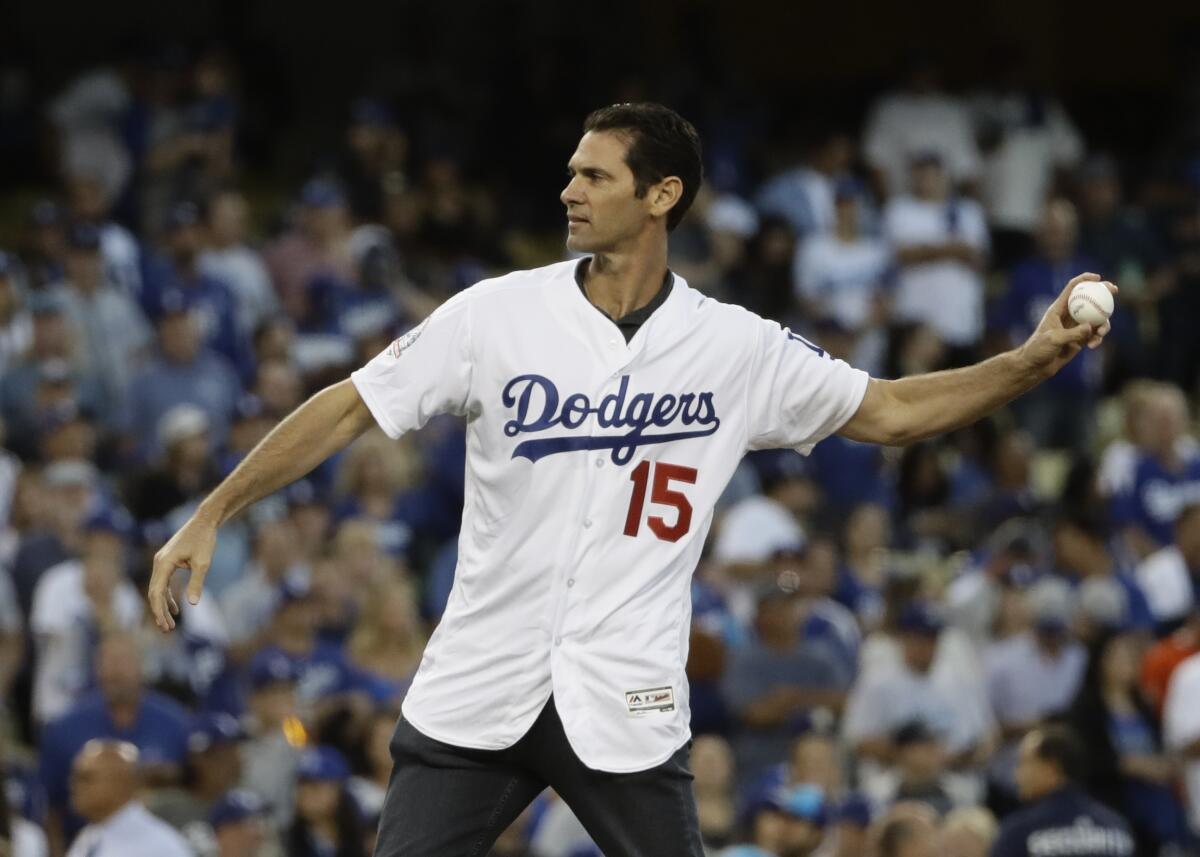
There were parallels to Ira’s experience coaching his own son, another tall, left-handed slugger who went on to a 15-year major league career, including five memorable seasons with the Dodgers between 2000 and 2004.
Ira only got into coaching when Shawn was 9, building a batting cage in the side yard at their home. Shawn remembers his dad devouring books about hitting by Hall of Famer Ted Williams and legendary hitting coach Charlie Lau, developing a “hitting bug” that benefited Shawn’s early development.
“It was a win-win,” Shawn said. “I got to spend time with him, got instruction and got better and better.”
Ira didn’t stop coaching once Shawn’s professional career took off. Instead, he opened his training center, called the Baseball Academy, in 1995. It was a modest place, a six-cage facility in a strip mall off the 55 Freeway next to a golf shop and a hockey equipment store.
Located just a 15-minute drive from Angel Stadium, it became a frequent offseason training spot for such big leaguers as Jim Edmonds, Garret Anderson and Darin Erstad each winter. Shawn, of course, was also a regular.
“A lot of people bounced in and out of that place,” Shawn said, “back when it was kind of the focal point for training in Orange County for baseball.”
Freeman relished the environment.
Like the other young students who trained there, he would rush to the 60-mph batting cage whenever the pro hitters were around — the big leaguers always used the slower machine, Ira said, because it was the closest thing to batting practice speed — to stick a quarter on the outside of the cage arcade-style, reserving his spot in line for when they finished.
One day, Shawn stuck around to watch the kids take swings. Freeman’s smooth motion immediately stuck out.
“He told Freddie, ‘You’ve got a great swing,’ ” Fred recalled. “Since then, Freddie was a Shawn Green fan.”
Shawn and Ira became fans of Freeman’s too, closely following his progress even after he stopped training with Ira in high school.
Ira would watch some of Freeman’s prep games at Orange El Modena, sitting in stands packed with scouts.
Shawn kept tabs on Freeman’s minor league career after he was drafted by the Atlanta Braves in the second round in 2007.
An inside look at how the Dodgers signed All-Star first baseman Freddie Freeman, including an impromptu call from Mookie Betts’ wedding.
“I think Freddie had the advantage of all the things, right and wrong, my dad learned working with me,” Shawn said. “He was able to pass on probably an even better version of his instruction to Freddie.”
In early 2009, Ira and Shawn worked with Freeman one more time.
A few weeks before spring training that year, Ira got a call from Fred. Freeman was coming off an impressive 2008 season in single A but was struggling to rediscover comfort with his swing ahead of the new season. Fred asked Ira whether he could come take a look, and Ira brought along Shawn (who had recently retired from the major leagues) to help out.
“It was like, almost a panic,” Ira recalled. “He just didn’t feel right.”
Ira suggested a few tweaks, focusing on the separation of Freeman’s upper and lower halves. A few days later, Freeman started feeling confident again — the student and instructor falling right back into their old rhythm.
“It was just seeing him and hitting and talking baseball,” Freeman said. “I got lucky getting lessons from him.”
- Share via
Dodgers Dugout: Might as well pack it up for this season
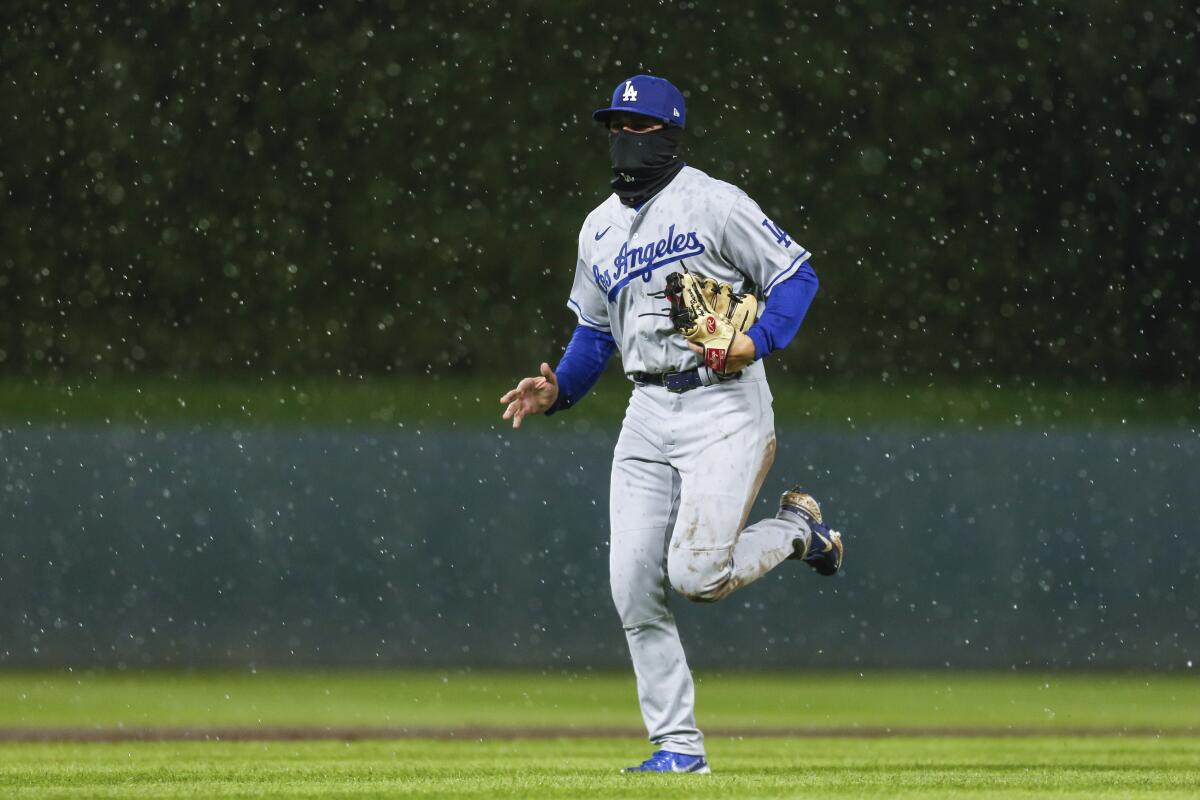
Hi, and welcome to another edition of Dodgers Dugout. My name is Houston Mitchell, and the season is over.
The Dodgers are 1-2 and can’t possibly make up the distance between them and the first-place team in the National League West. I mean, why even try. The first three games are always exactly how the entire season will go, meaning the Dodgers will finish 54-108 and the only guy on the team who will hit homers is Austin Barnes, who will finish with 54.
OK, now that we have that out of the way for the more pessimistic of you writing to me out there, let’s be real.
Are you a true-blue fan?
Get our Dodgers Dugout newsletter for insights, news and much more.
You may occasionally receive promotional content from the Los Angeles Times.
It’s only three games. You don’t get a real sense for how good or bad a team might be until at least 40 games. If the Dodgers are 10-30, then we can worry. Last season, they were 18-17 after 35 games, putting them on pace to finish 83-79. They won 106 games. The 2018 team was 4-9 at one point. They won 92 games and made it to the World Series. The 2017 team was 10-12 and won 104 games and made it to the World Series.
In Denver to open the season, the offense was shaky.
- Share via
Andrew Heaney and Dodgers deliver in rain-interrupted win over Twins
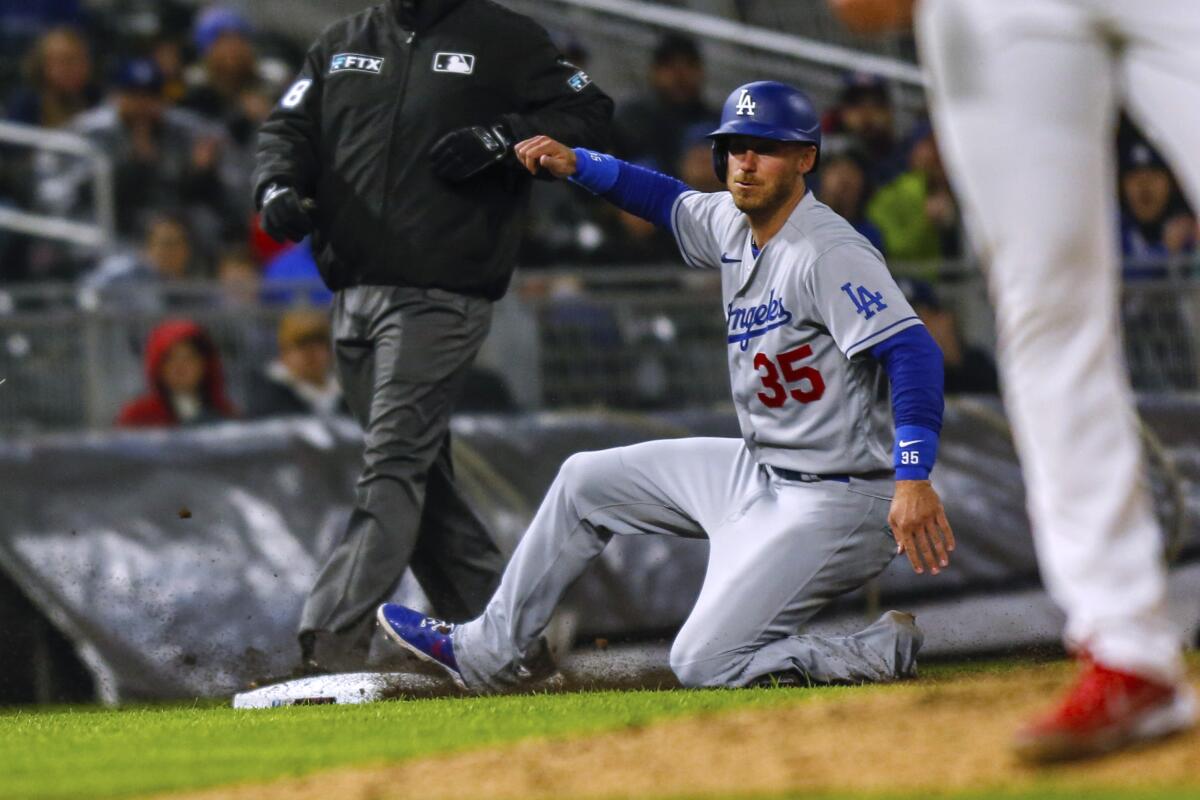
MINNEAPOLIS — The work began immediately after Andrew Heaney signed with the Dodgers in the offseason.
Upon agreeing to terms with the team on a one-year, $8.5-million deal in mid-November, Heaney flew to Los Angeles to get a physical but also to meet with the team’s pitching staff. He was well aware of the Dodgers’ track record of developing pitchers, of unlocking potential in even veteran arms.
And eight years into his own underwhelming major league career, the left-hander was eager to hear the Dodgers’ ideas for him for the upcoming season.
He believed that, with the Dodgers’ help, he could reach a new level on the mound.
Five months later, Heaney showed the first signs of progress Tuesday night, giving up one unearned run over 4 1/3 innings in his Dodgers debut.
The game was decided hours later after the Dodgers scored six runs in the eighth inning and then sat through an 88-minute rain delay en route to a 7-2 win over the Minnesota Twins.
- Share via
How to watch and stream the Dodgers in 2022
Here’s how to watch and stream the 158 games left in the Dodgers’ 2022 season:

